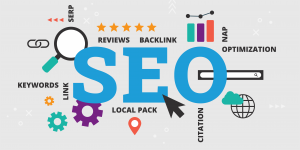In the fast-evolving world of financial technology (FinTech), website security is more critical than ever. As FinTech companies increasingly rely on their online platforms to provide financial services, security plays a significant role in both search engine optimization (SEO) and the trust that users place in their services. A secure website not only protects user data but also boosts SEO rankings and ensures a positive user experience. A FinTech digital agency can help businesses implement the latest security measures while optimizing their website for SEO. This article explores the vital link between secure website design, SEO performance, and user trust in the FinTech sector.
The Link Between Website Security and FinTech SEO
Overview of SEO in FinTech
In the highly competitive FinTech industry, maintaining a strong online presence through effective SEO strategies is essential for gaining visibility and attracting users. Website security plays an often overlooked role in SEO performance.
How Security Influences Google’s Ranking Algorithms
Google’s ranking algorithms consider website security as a ranking factor. Websites with SSL certificates and secure HTTP protocols (HTTPS) are favored by search engines. Google views secure websites as more trustworthy, which can result in better rankings for FinTech businesses.
The Role of SSL Certificates and HTTPS in Improving Search Rankings
SSL (Secure Sockets Layer) certificates encrypt the data transferred between a website and its users. This encryption is vital for protecting sensitive user information. HTTPS, which signifies a secure connection, is a direct ranking factor for Google. Websites that have SSL encryption and use HTTPS signal to search engines that they are trustworthy, resulting in a positive SEO impact.
The Impact of Website Speed and Technical Performance on SEO
Website security also affects technical performance, including loading speed and responsiveness. Secure websites typically load faster and perform better, which are key factors that influence both SEO rankings and user experience. Google considers page load speed as an important ranking signal, making security an indirect contributor to search engine success.

User Trust: The Cornerstone of FinTech Success
How Security Impacts User Perceptions and Trust
For FinTech companies, user trust is paramount. A secure website is a clear signal to users that their personal and financial information is safe. Lack of security can lead to user concerns about fraud and data breaches, diminishing trust in a brand.
The Relationship Between User Data Protection and Trust in FinTech Platforms
In the FinTech sector, data protection is directly linked to trust. Users expect platforms to safeguard their sensitive financial information, such as account details and transaction history. When a website lacks the necessary security protocols, such as SSL encryption, users may hesitate to interact with the platform, thus harming conversions and engagement.
Case Studies of Companies That Gained or Lost Trust Due to Security Breaches
Case studies of FinTech companies like Equifax (which suffered a major data breach in 2017) illustrate the consequences of inadequate security. The breach severely damaged the company’s reputation, highlighting how a failure to protect user data can result in both loss of trust and negative SEO consequences. On the other hand, companies that emphasize security (such as PayPal) tend to experience higher user retention and trust.
Essential Elements of Secure Website Design for FinTech
SSL Encryption and Secure Payment Gateways
SSL encryption ensures that all sensitive information is transmitted securely. For FinTech platforms, secure payment gateways are essential to protect users during financial transactions. Both SSL encryption and secure gateways reduce the risk of data theft and fraud.
Multi-factor Authentication (MFA) for Users
MFA adds an extra layer of security, requiring users to provide additional forms of identification (e.g., a code sent to their phone) to access their accounts. This prevents unauthorized access and enhances user trust in the platform’s security.
Protection Against Cyber Threats Like DDoS Attacks, Malware, and Phishing
FinTech websites are prime targets for cyber threats, such as Distributed Denial-of-Service (DDoS) attacks, malware, and phishing attempts. Implementing robust security measures, such as firewalls, anti-malware software, and anti-phishing technologies, helps protect the website from such threats.
Regular Security Audits and Updates
Frequent security audits and updates ensure that a website remains compliant with the latest security standards. This includes patching vulnerabilities, updating software, and performing penetration testing to identify potential security risks before they are exploited.
SEO Benefits of a Secure Website for FinTech Platforms
How Security Signals Are Interpreted by Search Engines
Search engines interpret security features like SSL certificates and HTTPS as positive signals of website quality and trustworthiness. A secure website is more likely to rank higher because it signals to Google that the site is reliable, safe, and user-friendly.
Decreased Bounce Rates and Improved Conversion Rates Due to Enhanced User Confidence
When users feel confident that their data is secure, they are more likely to stay on the website longer and complete actions like signing up for a service or making a transaction. Lower bounce rates and higher conversion rates contribute to improved SEO rankings, as Google factors user engagement into its algorithm.
The Long-Term Value of Website Security on Organic Traffic and Brand Visibility
A secure website not only provides short-term benefits in terms of SEO rankings but also delivers long-term value. Consistently high search rankings, coupled with positive user experiences, help increase organic traffic and enhance brand visibility over time.
Legal and Regulatory Compliance in FinTech Security
Overview of Industry Regulations Like GDPR, PCI-DSS, and PSD2
FinTech companies must adhere to various legal and regulatory standards related to data security. These include GDPR (General Data Protection Regulation) in Europe, PCI-DSS (Payment Card Industry Data Security Standard), and PSD2 (Payment Services Directive 2). Compliance with these regulations is crucial for protecting user data and ensuring that FinTech platforms operate legally.
Consequences of Non-Compliance for FinTech Websites
Non-compliance with security regulations can result in significant penalties, including fines and legal actions. Beyond the financial penalties, non-compliance also damages a company’s reputation and trustworthiness, which can negatively affect SEO performance and user acquisition.
How Compliance Boosts Both SEO Rankings and User Trust
Compliance with industry regulations not only protects users but also signals to search engines that the website adheres to best practices. This can result in improved search engine rankings and increased user trust, ultimately benefiting both SEO and user engagement.
Strategies to Improve Both Security and SEO
Integrating Security Best Practices Without Compromising User Experience
While security is essential, it’s equally important not to compromise the user experience. Simple steps like reducing the number of steps required for login or ensuring that the website remains fast despite encryption measures can help balance security and user experience.
Optimizing Site Architecture for Both Performance and Security
Website structure plays a critical role in both SEO and security. Organizing the site’s architecture for optimal security (e.g., limiting access to sensitive areas) can also enhance SEO by improving crawlability and page load times.
Effective Use of Tools Like Google Search Console and Security Plugins
Google Search Console helps monitor website health, while security plugins like Wordfence or Sucuri help prevent vulnerabilities. Using these tools together allows FinTech companies to optimize their website for both security and SEO.
The Financial Impact of Investing in Website Security
Direct Costs of Security Breaches and Data Theft
Security breaches can result in significant financial losses, including fines, legal fees, and loss of revenue from customers abandoning the platform. Moreover, repairing damage to a company’s reputation after a breach can be costly and time-consuming.
The Long-Term ROI of Secure Website Design on Customer Retention and Acquisition
Investing in website security leads to long-term benefits, such as improved customer retention and acquisition. Secure websites inspire greater user confidence, which can increase customer loyalty and attract new users. This results in a higher return on investment (ROI) for FinTech companies.
Why Investing in Security Is a Competitive Advantage in the FinTech Industry
As security becomes a critical factor for users, companies that invest in robust security measures gain a competitive advantage. Secure websites not only enhance user trust but also help FinTech platforms stand out in a crowded market.
Conclusion
Recap the Importance of Secure Website Design for SEO and User Trust
Website security is a fundamental element of SEO and user trust in the FinTech sector. Secure website design enhances SEO rankings, reduces bounce rates, and improves conversion rates, all while fostering trust with users. Compliance with industry regulations and the adoption of security best practices ensure a safe, user-friendly experience.
Encourage FinTech Companies to Prioritize Security as Part of Their SEO Strategy for Sustained Growth and Trust
FinTech companies must prioritize website security as part of their broader SEO strategy. By investing in security measures that protect user data and enhance the user experience, companies will not only improve their SEO performance but also build lasting trust with their customers, leading to sustained growth.














